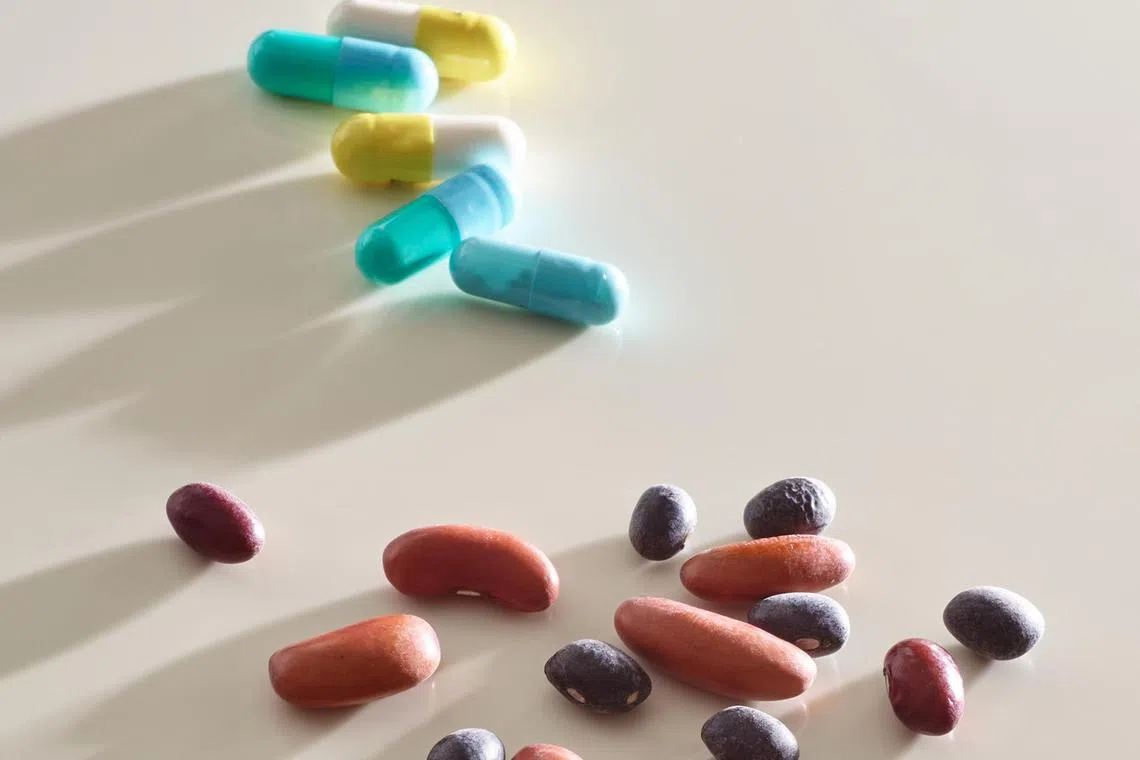What should I eat while taking antibiotics?
Sign up now: Get ST's newsletters delivered to your inbox

Some types of food are better at encouraging the “good” microbes to grow and discouraging the “bad”.
PHOTO: JOYCE LEE/NYTIMES
I was recently prescribed antibiotics and am worried it might kill the “good” bacteria in my gut. What can I do to minimise the damage?
Since penicillin was discovered in 1928, antibiotics have transformed once life-threatening infections into treatable conditions. But in the process of wiping out the “bad” bacteria, they can decimate the “good” ones too.
Fortunately, for most people, these effects on the gut microbiome are temporary, said Dr Tien Dong, a gastroenterologist at UCLA Health in Los Angeles, California. If you are generally in good health, “you’ll likely recover on your own”, he said.
Still, you can take actions to encourage that recovery. And while much of this research is limited and in its early phases, it does suggest the most important action is paying attention to your diet.
What do antibiotics do to your gut?
Antibiotics affect the microbes in your gut in a similar way that wildfires affect the plants and animals in a forest, Dr Dong said.
The landscape regrows, but with less diversity than before. The first plants to repopulate after a fire are weedy and opportunistic, and they grow all over the place.
The same thing happens in the gut after antibiotics, Dr Dong said. The initial bacteria to return are fast-growing generalists that quickly take over the gut. This forms a less diverse and, therefore, less healthy microbiome, he added.
Fortunately, broad-spectrum oral antibiotics will not kill your entire native flora, said Dr Amy Langdon, a microbial genomicist who recently left a postdoctoral position at Simon Fraser University in Canada.
Similar to how random patches of greenery might survive in a burnt landscape, small communities of good bacteria can hide in parts of the digestive tract that antibiotics cannot reach. “We’re counting on those to reseed the intestine,” Dr Langdon said.
Over time, those survivors – along with new bacteria you acquire from food, other people or your pets, for example – can edge out the weedy competition and rebuild a healthy microbiome.
That process may take longer for some people, such as young children, older adults or those who take antibiotics frequently. But most adults can expect their gut to return to normal within a couple of months, Dr Dong said.
What should I eat after antibiotics?
Your diet may be the most important element of recovery after antibiotics, said Dr Pawel Kiela, an immunobiologist at the University of Arizona Cancer Centre who researches the gut microbiome. Some types of food are better at encouraging the “good” microbes to grow and discouraging the “bad”.
Healthy gut bacteria tend to prefer fibre, for instance, Dr Kiela said.
In a 2021 study, scientists transplanted human faecal bacteria into two groups of mice – one on a low-fibre diet and another on a standard diet of mouse chow, which usually contains a mix of high-fibre grains.
After both groups were given antibiotics, the gut diversity of the mice on the low-fibre diet recovered more slowly than those on the standard diet, and some of their “good” bacteria never regrew. Their low-fibre diets also gave them a lower microbial diversity to begin with.
Federal health officials recommend that you consume at least 21 to 38g of fibre a day, depending on your age and gender. That is a good amount to aim for, Dr Kiela said, adding that onions, garlic, leeks, bananas, asparagus, artichokes, oats and legumes are great sources.
For some people, antibiotics can cause diarrhoea, bloating and cramping – and high-fibre foods can make symptoms such as bloating and gas worse, Dr Dong said. If you are not feeling up for a big salad or a plate of vegetables while taking the drugs, it is okay to wait until your symptoms have settled, he said.
There is also limited evidence that fermented foods or drinks like kimchi or kefir, which contain diverse communities of bacteria, can help replace the good bacteria you may have completely lost, Dr Kiela said.
Dr Langdon also suggested incorporating ginger into your diet. There is some evidence that it can reduce some of the symptoms associated with taking antibiotics, such as nausea, bloating and gas. Try steeping fresh ginger in water to make tea or blending a tablespoon of grated ginger into a smoothie, she suggested.
Should you take probiotics?
More than a decade ago, preliminary research suggested that probiotic supplements could help with some of the more sudden side effects of antibiotic exposure, such as diarrhoea and cramping. That prompted physicians to begin recommending probiotic supplements along with antibiotics, Dr Kiela said.
However, newer and more robust research suggests that probiotic supplements have no significant benefit for the gut microbiome after antibiotic use. And some research suggests they may even slow down gut recovery.
When a limited range of microbial species are introduced into the gut via supplements, Dr Kiela said, they compete for space and nutrients, and may even produce chemicals that prevent your own beneficial gut bacteria from regrowing.
The bottom line, he said, is that taking probiotics probably will not hurt. But will they help your microbiome rebound to exactly how it was before? “The answer is no,” he said. NYTIMES


